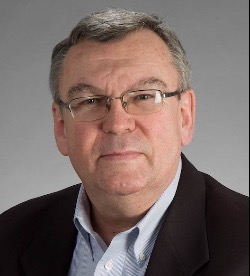In memoriam: Kenneth A. Krohn, PhD, emeritus professor of radiology, chemistry and radiation oncology
2024-11-05
Dear Colleagues,

Dr. Kenneth Krohn
We are very sorry to tell you that Kenneth A. Krohn, PhD, Emeritus Professor of Radiology, passed away Wednesday, Oct 23, 2024. Ken had been ill, but was an optimistic fighter and we were buoyed by his strength. Despite best efforts, his illness returned. We are glad he was able to return to his home and vineyard on the Olympic Peninsula after and between treatments.
He joined the UW Department of Radiology in 1981 to help with the radiolabeled monoclonal antibody therapy program at the Fred Hutchinson Cancer Center. He came from the legendary Donner Laboratory at the Lawrence Berkeley Laboratory, next to UC Berkeley. Prior to that he was an Associate Professor of Radiology/Nuclear Medicine and Acting Chief of Nuclear Medicine at UC Davis. His first faculty position was as a Research Instructor at the Mallinckrodt Institute of Radiology at Washington University.
This first faculty role followed a postdoctoral position with Michael Welch, a global leader in radiochemistry research. Ken and Mike Welch are listed in the Academic Chemistry Tree, showing the influence and mentorship (and connections) with thought leaders including Alfred Wolf from Brookhaven National Laboratory and Michael Ter-Pogossian at Washington University, who was one of the inventors of positron mission tomography. Ken received his PhD in Chemistry from UC Davis in 1971.
Ken was always a force in basic science research in our department and the University of Washington, where he was also a Professor of Radiation Oncology and Chemistry. He initiated an NIH P01 (a large program grant) in Metabolic Imaging of Cancer and Its Response to Therapy, which ran for 26 years. The program was innovative in developing new imaging procedures with PET and MRI to characterize (rather than detect) tumors in ways that have advanced treatment assessment with respect to therapy.
This started in an era where PET was considered a research tool for neurology and cariology, and Ken was one of the few leaders who envisaged its potential for oncology. His laboratory pioneered the development of PET agents for imaging cellular proliferation, regional hypoxia, acquired multi-drug resistance and hormone receptors. A long-term goal of his research was to develop and validate imaging analysis methods to support selection of targeted therapies and evaluation of response.
This led to multiple other grants, including a large instrumentation grant for the installation of the first cyclotron in the Department of Radiology. He was also influential in the installation of the first PET scanner at the University of Washington. The radiochemistry program he built with his colleagues in our department also led to many collaborations with other groups at UW and the Fred Hutchinson Cancer Center.
Over his career he received several awards recognizing his contributions, including being named a Fellow of the AAAS, the Paul C. Aebersold Award for Outstanding Achievement in Basic Science Applied to Nuclear Medicine from the Society of Nuclear Medicine, and the Distinguished Scientist award from the Western Regional Society of Nuclear Medicine. His impact on the field of molecular imaging of cancer led to roles on influential national advisory groups, including the Advisory Board for the National Cancer Institute at NIH and locally as an Associate Program Director for the FH-UW Comprehensive Cancer Center.
Those that worked or interacted with Ken know that he was both a careful and enthusiastic scientist and a critical thinker. This led to many productive grants and impactful publications. He picked topics that were important and also where he could make an impact. He was not shy, but always willing to provide advice when asked and have conversations focused on the next scientific challenge.
Towards the end of his career at UW his efforts were totally focused on mentoring the next generation of imaging scientists. Ken had a cadre of mentees that includes chemists but also physician-scientists, physicists, politicians and others. This is an indication of the importance of Ken’s research and mentoring for PET and molecular imaging.
At this time, we do not have information on memorial services or family contacts to send condolences to. If you would like to be kept informed, or leave condolences or remembrances for future delivery, please contact Angela Roesler-Lombardi (aroesler[at]uw[dot]edu).
His approach, his careful execution and especially his presence will be missed by those fortunate enough to work with him or hear one of his many scientific talks. He was a role model, mentor and friend to many of us. He will be forever missed, but always appreciated.
Sincerely,
Dushyant Sahani, MD
Chair, Department of Radiology
Paul Kinahan, PhD
Vice Chair of Research